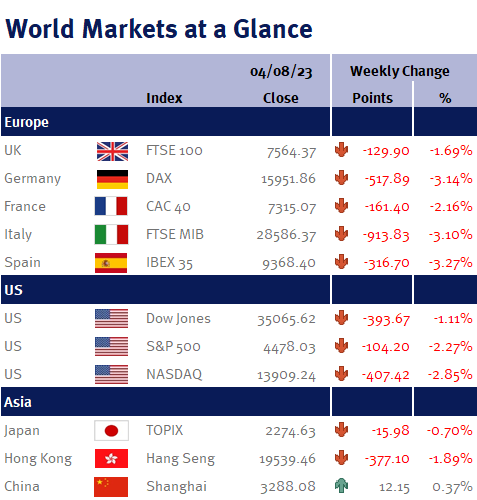Amidst a backdrop of a slowing economy and declining productivity, the recent hike has raised concerns. As we have said time and time again policymakers need to tread carefully, considering the effects of the previous increases which are yet to materialise in the wider economy. The job market did exhibit a moderation in pace, adding to bets of a possible rate pause in September.
Turning to the US, the labour market showed signs of gradual cooling. The non-farm payrolls report released on Friday revealed the addition of 187,000 jobs to the US economy in July, falling short of the 200,000 forecasted. The Federal Reserve appeared to view this development positively; despite the slight downtick in the annual unemployment rate to 3.5% and steady wage growth of 4.4%, the job market did exhibit a moderation in pace.
Looking to Japan, the adjustment in the Bank of Japan’s (BoJ’s) monetary policy in July, aimed to permit interest rates to rise more flexibly by adjusting the parameters of its yield curve control target. This week the BoJ introduced two unscheduled bond-purchase operations in an effort to moderate the pace of yield gains. The Central Bank is struggling to keep up with markets whilst remaining committed to its accommodating approach and considering the substantial interest rate differential between Japan and the US currency weakness continues.
There was positive news from China on Friday. A supportive stance from Beijing helped drive Chinese stocks, countering concerns stemming from recent economic data. Looking to support the private sector, the State Council of China unveiled a range of measures aimed at revitalising consumption, particularly in sectors such as automobiles, real estate, and services. The People’s Bank of China (PBOC) also announced its intention to sustain cuts in housing loan interest rates, while also guiding commercial lenders to make adjustments to rates for existing mortgages, providing further support to bolster the economy.
Coming up next week we have Chinese Balance of Trade, US trade data, Chinese & US inflation data and US initial jobless claims. On Friday we will also see how the UK economy has performed over Q2.
Kate Mimnagh, Portfolio Economist


